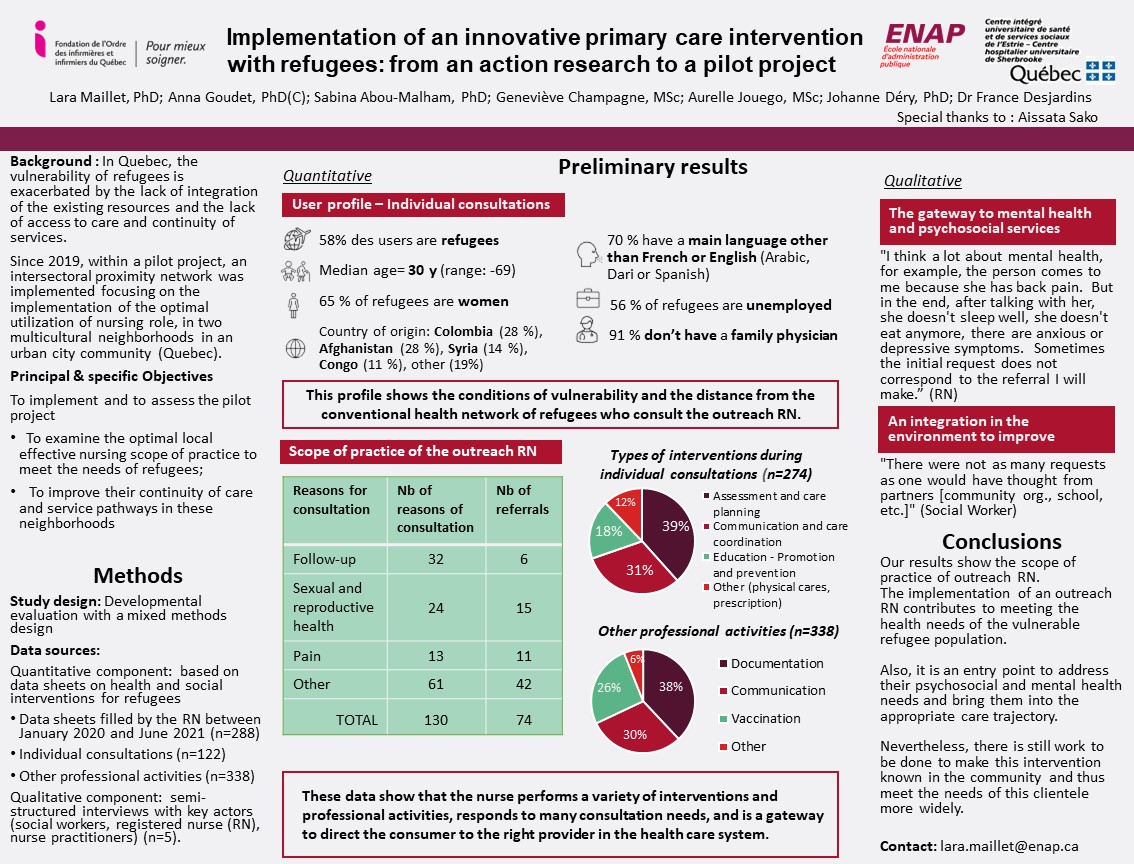PRP049: Implementation of an innovative primary care intervention with refugees: from an action research to a pilot project
Lara Maillet, PhD; Anna Goudet, MSc; Sabina Malham, PhD, MSc, RM; Geneviève Champagne, MSc; Aurelle Carole Jouego Fotso; Johanne Déry, PhD; France Desjardins, MD
Abstract
Background : In Quebec, the vulnerability of refugees is exacerbated by the lack of integration of the existing resources and the lack of access to care and continuity of services. An action-research project (Network 1, 2017-2018) on integrated first-line outreach interventions in a multicultural context in Quebec showed that it is a priority to set up an integrated outreach network for refugees that facilitates access to and continuity of care and services. Objectives: clinical (C) and evaluative (E): C) to implement an intersectoral proximity network, focused on the implementation and optimal utilization of nursing role; E) to understand and support in real time the implementation process of this network. Study Design : Developmental evaluation with a mixed methods design. Settings : Two multicultural neighbourhoods in an urban city community (Quebec). Method : The qualitative component includes: a document review; observations of participants during meetings of different governance structures; semi-structured interviews with key actors (n=40; 20/neighbourhood interventions); and discussion groups with refugees (n=4 groups). The quantitative component comprises: a data sheet on health and social interventions for refugees completed by nurses and social workers, and data analysis of the clinical-administrative database since 2012. Results: Based on the results of the previous action-research (2017-2018), a pilot project is being implemented since 2019. We will present the first steps, based on the research team's construction of the project's logic model, the mapping of the network's services and the nursing role diagram. The qualitative results related to nursing role show an optimal use of the nurses' scope of practice which allows to meet the needs of the users encountered (refugees and vulnerable persons unattached to family physicians) in terms of navigating across the health system, monitoring medication administration and collective prescription, etc. However, a lack of fluidity in the information’s flow related to logistical access to patient records by nurses hinders the continuity of health services. Conclusion: This project will contribute to improve accessibility, continuity of care and services delivered to refugees. Findings may contribute to influence policy and practice in primary care settings and to generate new theories for innovations in nursing care administration, in participative evaluative research and in the field of governance.

Diane Harper
harperdi@med.umich.edu 11/21/2021Yes, you have captured daily primary care! Thank you for sharing with us at NAPCRG.